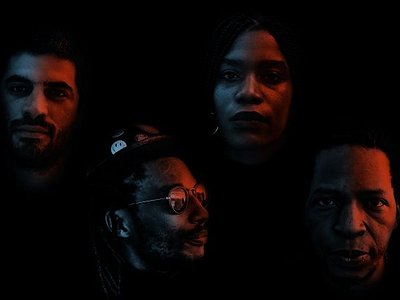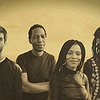Page 1
Name: SPAZA
Members: Ariel Zamonsky, Gontse Makhene, Malcolm Jiyane, Nonku Phiri, Dion Monti, Andrew Curnow
Occupation: Jazz ensemble
Nationality: South African
Current Release: UPRIZE! on Mushroom Hour Half Hour
Recommendations:
DION MONTI:
HERE I AM, by Jonathan Safran Foer is a remarkable book. It tells the story of change within the life of a family. By the end of the book, I felt like I was part of the family.
The only other book that made me relate to all sides of a story like that is THE BROTHERS KARAMAZOV, by Dostoevsky. Although he managed to push this still quite a bit further; for me to love and hate the family members as if they were my own blood with all their messiness …
Both authors allow us to love reality because of its complexity and contradicting interests … it makes us enjoy counting the leaves of a tree. We need this right now.
MALCOLM JIYANE:
Music: PROJECT ELO, by Tumi Mogorosi. And I PAINT WHAT I LIKE — my own art exhibition.
ARIEL ZAMOSKY:
MEMORIA DEL FUEGO by Eduardo Galeano
ANDREW CURNOW:
ZIMPHONIC SUITES, by Zim Ngqawana. It’s a masterpiece in all respects, and one of the most exceptional albums to come out of South Africa in the last few decades. It’s an album that everyone on Earth should hear. I am able to completely escape my mind and disappear into all the worlds Bra Zim conjures.
If you enjoyed this interview with SPAZA, check out their music on their bandcamp account.
When did you start playing your instrument, and what or who were your early passions or influences? What is about music and/or sound that drew you to it?
Ariel Zamonsky: I was 13; I wanted to play music with my friend who was playing guitar so I guessed if I started playing bass we could jam together. Music has always been a way of interacting with other people for me.
For most artists, originality is first preceded by a phase of learning and, often, emulating others. What was this like for you? How would you describe your own development as an artist and the transition towards your own voice? What is the relationship between copying, learning and your own creativity?
Malcolm Jiyane: My love for music started very early —around 7 or 8— our church keyboardist fascinated me. I used to watch him play and dream of touching it. And that opportunity came when I was 16, when I joined the music Academy of Gauteng — it was the first time I heard a trumpet, drums, bass, and piano being played live, close to me. I remember that morning very well, my hair stood on end, and my whole being was electrified with vibration. The teachers asked who wants to try drums, I raised my hand, sat on the drums, and the next thing I hear is the whole class clapping their hands, amazed by what they heard me doing while I didn't even know what was I doing. From that moment on I feel in love with the drums and music in general, and never looked back.
When I was not practicing drums I'd be practicing piano, then fell in love with piano. And then I had a friend who played trombone, and he was lazy sometimes and would leave the trombone lying around. I'd steal it and play it. Over time, doing that and watching him play, I learnt how to play trombone as well. From then on, studying music and listening to records, reading books, watching DVDs, performing and travelling, doing jam sessions, I slowly understood how music makes me feel and how I'd like to see myself on stage, making my own music and making my own records. Out of that desire and listening to great masters, blown away by their craft, one starts craving to do the same and affect other people in the same way.
What were some of your main artistic challenges when starting out as an artist and in which way have they changed over the years?
Nonku Phiri: I don’t always look at challenges as a bad thing. Some of the challenges that I faced in starting my own career just came with finding my own voice and then being able to confidently trust that as an expression. And I guess over the years it’s become a whole lot easier. I think I’ve always had a very childlike approach to my creative process, which then allows for me to be slightly more malleable. I look at challenges as stepping-stones, or meditations of showmanship, with a lot of serendipitous collaborations.
Currently, I’m finding ways to constantly create, finding ways to explore my varied talents … and I think then finding ways to articulate or clearly define what my story is, what my contribution is to the storytelling pool. That is the challenge now, to find very simple ways to clearly articulate what it is I need to add or contribute to the collective pool of messengers.
Tell me about your instrument, please. How would you describe the relationship with it? What are its most important qualities and how do they influence the musical results – and possibly even your own performance?
Gontse Makhene: My instrument is the percussion and my relationship with my instrument is that of love and understanding. In terms of me being able to play the Djembe, I have to understand that my hands have to be warm and the skin the same. Also by the time we are both warm magic happens and messages come through us as a unit, no longer me playing the djembe but music playing through the vessel we are.
Derek Bailey defined improvising as the search for material which is endlessly transformable. Regardless of whether or not you agree with his perspective, what kind of materials have turned to be particularly transformable and stimulating for you?
Malcolm Jiyane: I get everything from the creator, GOD, overwhelmed by how he created the universe, Earth, nature, and everything that lives above and below.
How is playing live in front of an audience and in the studio connected? What do you achieve and draw from each experience personally? How do you see the relationship between improvisation and composition in this regard?
Nonku Phiri: I love playing live. And based on the nature of my live set, it depends very heavily on the engagement, improvisation, and energy of the room, which allows for the set to never ever be the same. I prefer to lean more into the mood of the night, versus being confined to the restrictions of a backing track or having to play the same songs over and over again.
I find a way of creating a skeleton that allows for us to be more intense or faster, or create a more delicate and more emotive palate — if that’s what we find the crowd needs. After all, the interaction between artist and audience is its own collaboration. And we can only hope that people leave the space feeling different, in a very positive way. For us it’s always … wanting people to feel a sense of renewal, or just dance, or immerse themselves in what they’re listening to. Playing in front of an audience is amazing, to connect as one vessel for an hour, to share an experience, is vital to my creative journey.
Could you take us through a day in your life, from a possible morning routine through to your work? Do you have a fixed schedule? How do music and other aspects of your life feed back into each other - do you separate them or instead try to make them blend seamlessly?
Ariel Zamonsky: At times I’ve had routines. They really help, especially if you are working towards something, I’m planning on recording an album soon so I would probably go into routine mode for that purpose. Everything that happens is interrelated, I try be healthy, eat well, exercise, read things that inform me, and be creative as much as I can. And not worry about things I can’t control.
Could you take me through the process of improvisation on the basis of one of your performances that's particularly dear to you, please? Where did the ideas come from, how were they transformed in your mind, what did you start with and how do you refine these beginnings into the finished work of art?
Malcolm Jiyane: Everything that lives improvises. Improvisation to me is life itself, and I use it to communicate, and to express various emotions. Improvisation is language, so every time I open my mouth, or think, or imagine, or play my instrument, or just talking. So, every time I'm on stage it feels like a Godly moment, and so very precious. Ideas come from anything, anywhere, anyhow — unplanned. And how they transform is always shaped by what they require in the moment, and from there art comes alive and lives forever.






